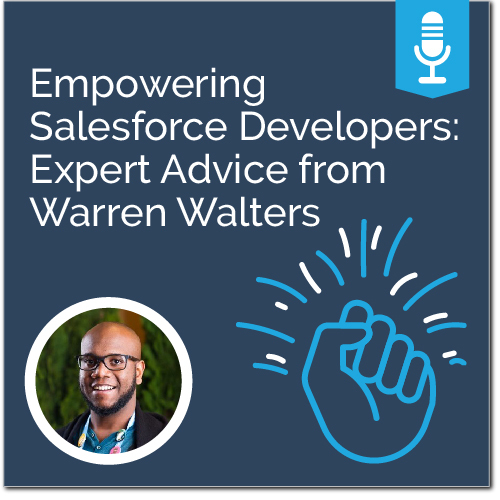Empowering Salesforce Developers: Expert Advice from Warren Walters
Episode Notes/Resources:
In this episode of Salesforce Simplified, we’re talking with Warren Walters, the Founder/Chief Programmer Path Planning Officer at Cloud Code Academy, about the biggest issues Salesforce Developers and Admins face today, how to get right with them, and tips for new Developers and Admins.
Warren has over 10 years of experience as a Salesforce Developer, is 18X Salesforce Certified, and at Cloud Code Academy, Warren oversees all aspects of the Cloud Code Salesforce development training program. This includes delivering live lessons, building out the material, and helping developers navigate their careers. I also create videos and free resources for aspiring developers and build relationships with businesses to hire developers.
Transcription
Speaker 1: This is Salesforce Simplified, the podcast from Ad Victoriam Solutions.
Mike Boyle: I’ve been wanting to do this episode of Ad Victoriam, Salesforce Simplified for quite a while. Hi everyone, thanks for joining us today. The topic today is Salesforce® Developers and admins and some of the things that they face today, how to get right with them, and some tips for new Salesforce Developers and admins. And there was only one person who came to mind what I wanted to do this. His name is Warren Walters. Let me tell you a little bit about Warren. Warren has over ten years of experience as a Salesforce Developer. He’s an 18x, let me underline that again, 18x Salesforce certified evangelist and he has a company that’s called Cloud Code Academy which helps developers and we’ll talk a little bit more about that. Warren also has a great YouTube channel and some other resources that we’ll talk about as well. Warren, thank you for joining us. It’s great to have you here on the podcast with us.
Warren Walters: Yeah, thanks Mike for having me. This is super exciting and I’m glad I came to mind. The only person… really? I kid!
Mike Boyle: We do have to be transparent here too as well. You were one of the very first series of guests that we had on this podcast when we started it almost five years ago. And okay, you are a former colleague at Ad Victroriam Solutions, so there’s the transparency, but it’s a thrill to have you. So some of the things that we’re going to cover today, just so everyone knows where we’re going to go, is we’ll just talk some general issues and challenges. I want to talk about some technical challenges and best practices for Salesforce Developers and Admins. I want to talk about the Salesforce platform and the ecosystem and some things that people need to be paying attention to, some career advice, that’s always a great thing. And then I’m going to ask you to pull out your crystal ball and we’ll talk about some future trends as well. So Warren, let’s start here. Talk to me about one of the most pressing challenges that you see Salesforce Developers and Admins face today.
Warren Walters: So some of the really pressing challenges that I’ve seen are around just how vast Salesforce is getting over the past few years, right? So I’ve been doing this for about ten years now and the platform has changed so much and you’ve probably seen it too, Mike, where we started in classic, or at least that’s where I started and there was a pre-classic before a pre interface before I really got into Salesforce. So we started in Salesforce Classic, then moved over to Lightning, and then all throughout that time there’s been tons and tons of updates and iterations on the platform. And on the developer side, you have things like components, lightning web components that you have to learn. And then on the administrative side all of these kind of go together. But on the admin side, you just have so many different tools and technologies that have come out like CPQ and revenue, cloud, marketing cloud. It’s hard to really wrap your head around all of the different features and capabilities that Salesforce is producing, but it also opens up a ton of opportunities for somebody to either niche down or to really expand out into certain areas that they want to go into. So a lot of people really get overwhelmed with all of the different things you can learn in Salesforce and that’s where I’ve started helping out and a lot of other people that have been in the Salesforce ecosystem for a while come in and they help educate people on like what is important to focus on. How do you learn different tools and topics and where you want to kind of focus so you can set yourself up for a successful career in Salesforce?
Mike Boyle: It might kind of seem obvious, but these challenges that you’re focusing in on in your honing here really revolve that is around learning. So over the past few years, what do you think has driven this surge to learning in the Salesforce world?
Warren Walters: It’s definitely an expansion of the overall products. And then on the Salesforce side as a company, they want to have people who can help facilitate these things for their businesses because if the business is running smoothly with an admin or development team inside of there, they may think to expand on the offerings that they offer because they’re getting so much value out of the platform, they’re able to speed up their productions or automations and just service their customers a lot better. And that’s where it comes into like having a solid foundation for the Admins, Developers, whoever’s on the team. If they have a good solid understanding of how the platform works, then it’s going to be built out better, there’s going to be better adoption, everything’s going to run smoother and you’ll just get a lot more done as you’re going along and working with the platform.
Mike Boyle: I want to talk a little bit about technical challenges and best practices. Some of the most common technical hurdles Developers encounter when working with Salesforce these days. Talk a little bit about some of those and how they can be overcome. Yeah.
Warren Walters: Ah, on the dev side it is mostly on triggers and integration. So from the trigger side of things, it’s understanding how to set up your triggers successfully and then having those work with the other automation tools that exist in configuration or Salesforce setup. So take for example, you have a trigger that is on the opportunity and it’s updating a few related records and let’s say processing some fields and making sure that they’re formatted correctly. Well, if there’s also a flow that’s doing something very similarly on that same opportunity, then there could be conflicts there. So a lot of times devs need to understand the whole landscape of how their salesforce is working and the automations that are going on and then how to put those together successfully either in trigger frameworks and bulkifying your code. So these are key terms, key things that beginner devs need to learn and to understand to make successful Salesforce automations. And then on the integration side, I don’t know if I’ve been in any orgs that just use Salesforce, right? There’s. For some reason and for good or for bad, there are just other systems that your CRM needs to talk to to get information from. So integrations play a key role in a lot of what you’re doing inside of Salesforce. And knowing how to set those up successfully and securely is super important for any dev to get their head around, or else they could potentially run into bad code or brick the system. Even like I’ve run into instances where there are API limits. So we’ve talked about governor limits before on the show. And those governor limits, they do apply to integrations as well. So knowing those and how to get around them, how to understand them, is super important for when just any aspect of Salesforce, but especially integrations if it’s something that’s crucial that your company relies on.
Mike Boyle: I want to talk a little bit about best practices next. Warren, you started kind of going down this road with coding. As a Salesforce developer. What do you need to be paying attention to in terms of best practices for things like coding standards and testing and version control? Things along those lines?
Warren Walters: Super great question. I think that there are some key, like operational best practices as a dev. So you mentioned a few things like having your version control and having that process set up a lot of time. There’s not a one-size-fits-all for version control, but there are pretty well-defined or outlined standards that you can follow that will most likely fit your business’s needs or whatever your coding needs are. So you want to try to not reinvent the wheel when possible and reach out to or look at other examples of companies or people that you follow that have outlined examples of how you want to use do some of these DevOps processes. So version control is a big one. You need to have it. And if you’re kind of unfamiliar with version control, it’s just really having a snapshot of, all the metadata and your code inside of your at a specific time. So if you make some changes and something breaks in the future, you’re able to look back at that snapshot and say, okay, what have we changed in the meantime? And how do we go back? How do we figure out what that problem is? And then of course there are like the coding standards and testing and gosh, testing is a big one, right? Testing is super important for really helping your future self figure out errors and get to problems faster than, whenever you make any changes. So Salesforce already has the 75% code coverage amount that you need to meet. But on top of that, you want to try to have meaningful tests. And what this means is something that when they actually, when a change actually happens, when you’re running your test, they have a reasoning behind them and they have kind of weight behind them. So you’re doing asserts inside of your test, you’re testing with multiple data and you’re not just trying to get that code coverage number you’re really thinking about is your test testing the code that you’re putting in there. And is it actually working? All right, if you make a change, will your test break and can you then figure out what the problem is? Because of all the other automations that have come through, I want to talk.
Mike Boyle: A little bit about the platform itself. Those of us who work within the ecosystem, if you will, we understand how the platform has evolved over the years, and sometimes it does overnight. Talk to me and the audience about what are some of the key features or capabilities that Developers should be aware of as the platform has evolved.
Warren Walters: Of course, you’ve got to have all of the AI features on your radar, whether it’s, I think it’s agent force now, right? It was Einstein before and now we’re on Agent Force. So whatever the AI features, you have to keep an eye out for them just so that you’re staying up to date with everything that is going on. You don’t want to be left behind. And I, for myself personally, embrace the AI features so they have things like code completion and some of the prompt generation and test class creation, which you know is super great for the things that I mentioned before. If you’re able to use generative AI to then generate test classes for you, it’ll help you work a lot faster. So I think the important thing to remember though is use it as a tool, not as a crutch. So anytime I’m teaching students about some of the AI tools, it’s really how can it help you explain certain things? How can it help you write things faster? But you still need to understand how everything works under the hood. So I think that’s a big one. And I can harp on AI stuff all day long, but also on the platform, it’s really about specifically for devs, learning about some of the different tooling changes that are coming our way. So these are things like visual studio code and the idea how that can then sync with your salesforce.org so you can write code faster and more efficiently. And then finally on that I’ll just kind of mention just the overall new clouds that are coming out are really interesting. So we’ve got things like manufacturing cloud and revenue cloud. And if you either have prior experience with those areas or they interest you, some of those things can be really great to jump in on early and especially from the dev side, learn the underlying aspects of it, or even think of like b, two b commerce, right? Or I guess it’s b two c commerce now as they’re bringing a lot of it on the platform. Getting in there early as a dev, and learning how the underlying frameworks work will give you a leg up if either you’re searching for a new role or just trying to be that SME in your company.
Mike Boyle: You were talking about tools a moment ago. I’m just curious, your thoughts on some of the most valuable third-party tools or integrations that Developers, whether the established or new and up and coming and admins as well, can leverage to enhance their Salesforce experience.
Warren Walters: I would say Chrome extensions, there are some really great ones out there, I think. What is it? Salesforce Inspector Reloaded has gained a lot of popularity. So check, that one out. It just adds an additional layer of tooling and queries and data exports right inside of your browser, which is really fun. I’ve also made a Chrome extension because sometimes I get a little spiteful with Salesforce. So that one’s called the “Why Salesforce” Chrome extension and all it really does is add tabs in the setup, customizable tabs. So that one’s really just for fun and something that I wanted personally. And then on the dev side, a lot of the ideas like Visual Studio Code is what Salesforce recommends and it’s great. But for my professional use, and I’m not sponsored anything by this, but I use Illuminated Cloud, which is on the Jetbrains platform. So Illuminated Cloud is really great for the developer experience. Right. It just adds a lot in where Visual Studio Code is still trying to like catch up or make some updates, to get that done. But that one is a paid tool and a lot of times I recommend people, you know, get their employers to pay for it for them. But it is, that’s the one that I use on a day to day to day basis and it is, it’s great. And I recommend that to everybody if you can. Ideally, you know, get it paid for. But Illuminated Cloud, super great. And then of course the AI tools, right, figure out ChatGPT or Claude or whichever one you want to use. Or GitHub, Copilot, right, that one’s also, out there as well. Those tools can once again, they’ll help speed you up, but sometimes they’ll spit out gibberish, especially for Apex. So you need to make sure to know those fundamentals, that foundation of programming so that when it does spit out gibberish, you can correct it. And it’s not hindering you, it’s being used as a tool, as an asset.


